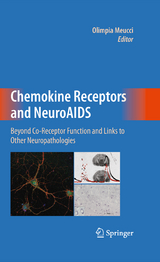Chemokine Receptors and NeuroAIDS
Springer-Verlag New York Inc.
978-1-4419-0792-9 (ISBN)
Chemokine Receptors and NeuroAIDS: Beyond the Co-receptor Function and Links to Other Neuropathologies focuses on unresolved or emerging issues concerning the role of chemokine receptors in neuronal injury and HIV neuropathology, including their ability to regulate fundamental neuronal and glial functions and their role in neurovirulence and neurotoxicity. Although the importance of these molecules in the CNS physiology and pathology is now apparent, these issues are still matter of debate, and further research is required to design effective pharmacological agents that specifically target the brain chemokine system without major side effects.
To this end, specific topics have been selected and are reviewed by international experts within the basic science/medical community. This book encourages investigation in the most controversial areas and fosters interaction between clinicians and basic scientists. The book also increases awareness about differences in disease progression among different parts of the world as well as selected patient populations, which may also help identifying novel therapeutic strategies.
About the Editor: Olimpia Meucci, MD, PhD is a Professor of Pharmacology and Physiology & Microbiology and Immunology at Drexel University College of Medicine in Philadelphia, PA. Since her seminal discovery about the regulation of neuronal signaling by chemokines, her research has primarily focused on the physio-pathological roles of this important class of neuroimmune modulators in the central nervous system and their involvement in neuroAIDS. These studies have significantly contributed to current understanding of the cellular and molecular mechanisms of HIV-related neuropathology including the interaction of the chemokine system with drug of abuse, namely opiates, which continues to be a major area of investigation in the Meucci lab.
Section I.- HIV Neuroinvasion: Early Events, Late Manifestations.- HIV Co-receptors: The Brain Perspective.- HIV Infection and the PNS.- HIV Latency and Reactivation: Role in Neuropathogenesis.- HIV Coreceptors and Their Roles in Leukocyte Trafficking During Neuroinflammatory Diseases.- Section II.- Chemokine Proteolytic Processing in HIV Infection: Neurotoxic and Neuroimmune Consequences.- Chemokines and Chemokine Receptors in the Brain.- Chemokine Signaling in the Nervous System and Its Role in Development and Neuropathology.- Modulation of Neuronal Cell Cycle Proteins by Chemokine Receptors and Its Role in the Survival of Postmitotic Neurons.- Chemokines and Primary Brain Tumors.- Chemokines as Neuromodulators: Regulation of Glutamatergic Transmission by CXCR4-Mediated Glutamate Release From Astrocytes.- Role of CX3CL1 in Synaptic Activity and Neuroprotection.- Section III.- Interaction Between Opioid and Chemokine Receptors in Immune Cells: Implications for HIV Infection.- Chronic Morphine’s Role on Innate Immunity, Bacterial Susceptibility and Implications in Wound Healing.- Opioids, Astroglial Chemokines, Microglial Reactivity, and Neuronal Injury in HIV-1 Encephalitis.- Regulation of Neuronal Chemokine Receptor CXCR4 by ?-Opioid Agonists and Its Involvement in NeuroAIDS.
| Zusatzinfo | XVI, 412 p. |
|---|---|
| Verlagsort | New York, NY |
| Sprache | englisch |
| Maße | 155 x 235 mm |
| Themenwelt | Medizin / Pharmazie ► Medizinische Fachgebiete ► Mikrobiologie / Infektologie / Reisemedizin |
| Medizin / Pharmazie ► Medizinische Fachgebiete ► Pharmakologie / Pharmakotherapie | |
| Studium ► Querschnittsbereiche ► Infektiologie / Immunologie | |
| Naturwissenschaften ► Biologie ► Humanbiologie | |
| Naturwissenschaften ► Biologie ► Mikrobiologie / Immunologie | |
| Naturwissenschaften ► Biologie ► Zoologie | |
| ISBN-10 | 1-4419-0792-0 / 1441907920 |
| ISBN-13 | 978-1-4419-0792-9 / 9781441907929 |
| Zustand | Neuware |
| Informationen gemäß Produktsicherheitsverordnung (GPSR) | |
| Haben Sie eine Frage zum Produkt? |
aus dem Bereich




